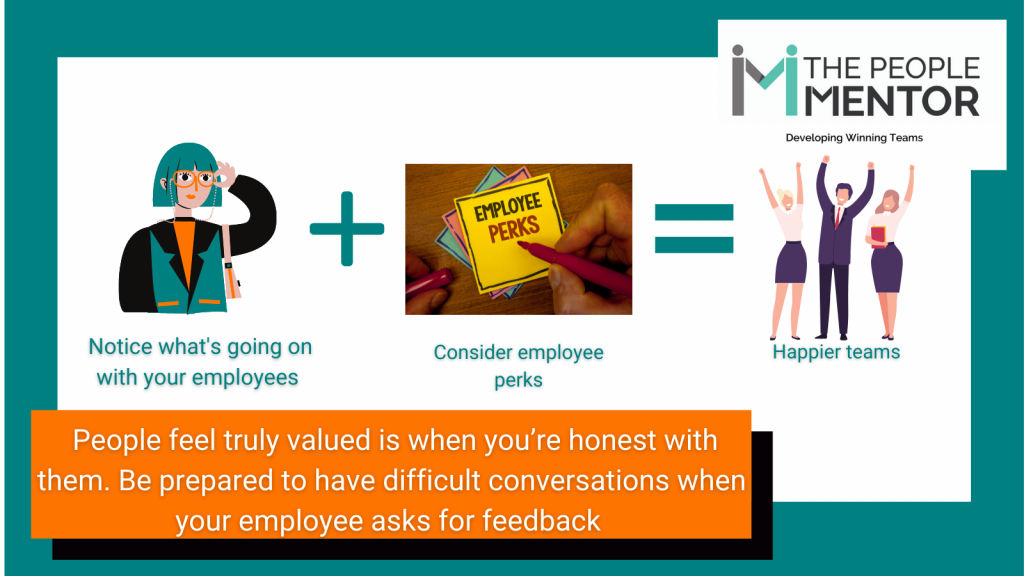Are you sitting comfortably? Welcome to my series of podcasts that will help you to navigate those inevitable difficult events at work that are part of being a manager.
Today I want to talk about how to show employees you appreciate them.
How do your employees see you?
Do they see you as strong, forceful, opinionated and distant, or empathetic and approachable? Maybe you’ve cultivated the strong stand-offish persona because you think that employees will respect you more.
But if you have no personal connection with your employees, you’re missing a trick, because when employees feel valued, appreciated, and trusted by their managers, they are more likely to be engaged and committed to working hard for the organisation.
It is understandable that many leaders find it hard to get a balance between forging a personal connection with employees and being in charge, but finding balance is possible. Here’s what you can do to show employees that you appreciate them.

The first way is to take the time to notice when all is not well:
Yes, your employees are there to do a job, but they are also human beings who may have personal issues. Whether it’s problems with their home life, their health, or it’s work-related, just taking the time to notice when someone may be having a tough time makes a difference.
If you notice that they’re much quieter than usual or they are coming into work late, speak to them and offer support. When an employee feels supported they are much more likely to work hard for you and be loyal, and it also builds a sense of trust.
Next, try to relate to employees.
Don’t sit in your ivory tower, give employees the benefit of your experience if they’re having a problem, or they need advice. This will show them that you are a human being after all!
You can ask about their family too; you don’t need to add them to your Christmas card list, but showing an interest will make them see that you’re interested in them as a person, not just as a number.
Another important thing you can do is to offer them some perks, no matter how small, to show them how much you appreciate them. Organising social events, away days, or relaxation sessions are all great ways to show an employee that you do recognise and value their hard work.
Making employees feel valued goes a long way to creating enthusiastic, dedicated, and happy teams of employees.
Don’t underestimate the value of sending an email thanking employees for their contribution to a successful project; you’ll be surprised at the positive effect it has on morale.
The next thing is to make time for employees;
I know; time-that precious commodity nobody seems to have enough of! But employees won’t feel appreciated if they feel that you’re not prepared to spare even a few minutes for a chat. By making time for regular conversations and holding staff meetings, employees will feel that their concerns, ideas, and suggestions are appreciated and valued.
Another thing that makes people feel truly valued is when you’re honest with them. Be prepared to have difficult conversations when your employee asks for feedback, or when you have to address a performance issue.
It’s better for them and the organisation in the long run to tell them the truth. After all, if they have no idea that anything is wrong, or their performance is not meeting the standard, how can they do something about it?

Lastly, give employees the opportunity to develop.
Just as there are some people who turn up and punch the clock for their pay cheque, there are also people who are hungry to learn new things and develop.
If an employee shows interest in another area of the business or you notice that they have certain attributes that might be useful in a project that they usually wouldn’t be involved in, why not let them spread their wings and gain new skills and experience?
This will make them more engaged and motivated, plus developing people can only be good for the business.
It’s been shown that an empathetic manager who values and appreciates employees inspires more trust and builds stronger, more engaged teams.
You will come across situations where you can’t help an employee with their problem or offer advice because you lack the knowledge or experience, but you can find other ways to support them, such as referring them to a counselling service.
The main thing is that you support them, in the way that you would want to be supported if you were in their position. Do that, and you’ll have an employee who is loyal and committed to the business, works hard, and wants to stay.
I hope that you got some good tips from today’s podcast, and I’ll see you next time.
This is The People Mentor, signing off.
Read more here about influencing and persuading employees.
Want insights into leading change -the tips they don’t tell you subscribe below 👇🏻






